Culture Interview and Personal Profile Report: Leadership Module
VerifiedAdded on 2020/10/22
|11
|3686
|59
Report
AI Summary
This report presents a comprehensive analysis of a culture interview and personal profile, reflecting on cross-cultural competencies and a case study of KazOil. The first task involves an interview with Mr. Lokesh Bansal, exploring his background, cultural values through Hofstede's model, and roles within his family, culture group, and society. The second task uses Kolb's experimental learning cycle to reflect on cross-cultural competencies gained from the interview. The final task analyzes a case study on KazOil, examining challenges and responsibilities for global managers, specifically focusing on motivation, human resource management, and communication barriers within the context of acquisitions. The report explores alternative courses of action for global managers to improve market share and address issues like lack of motivation and communication problems, highlighting the significance of effective communication channels and HR practices in a global business environment.
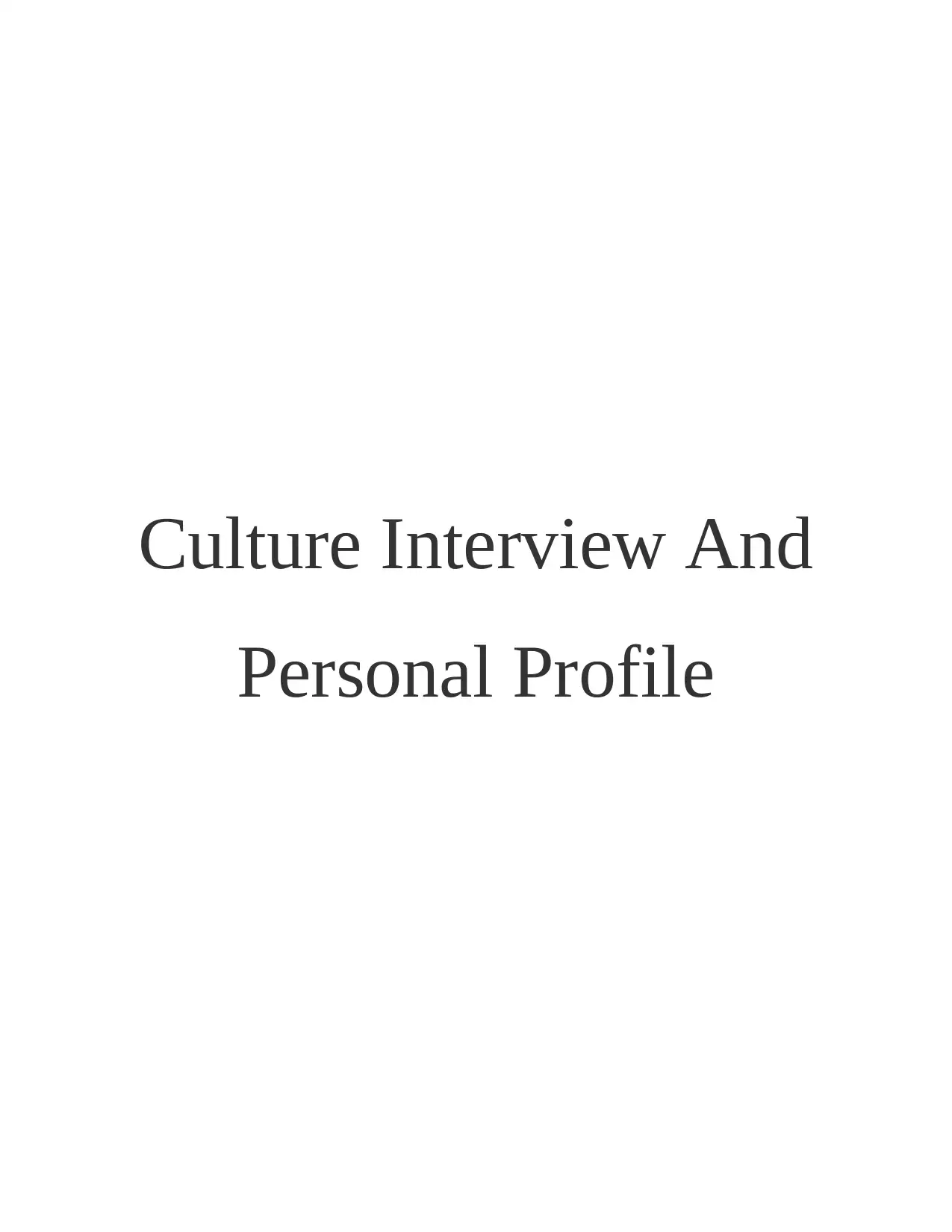
Culture Interview And
Personal Profile
Personal Profile
Paraphrase This Document
Need a fresh take? Get an instant paraphrase of this document with our AI Paraphraser
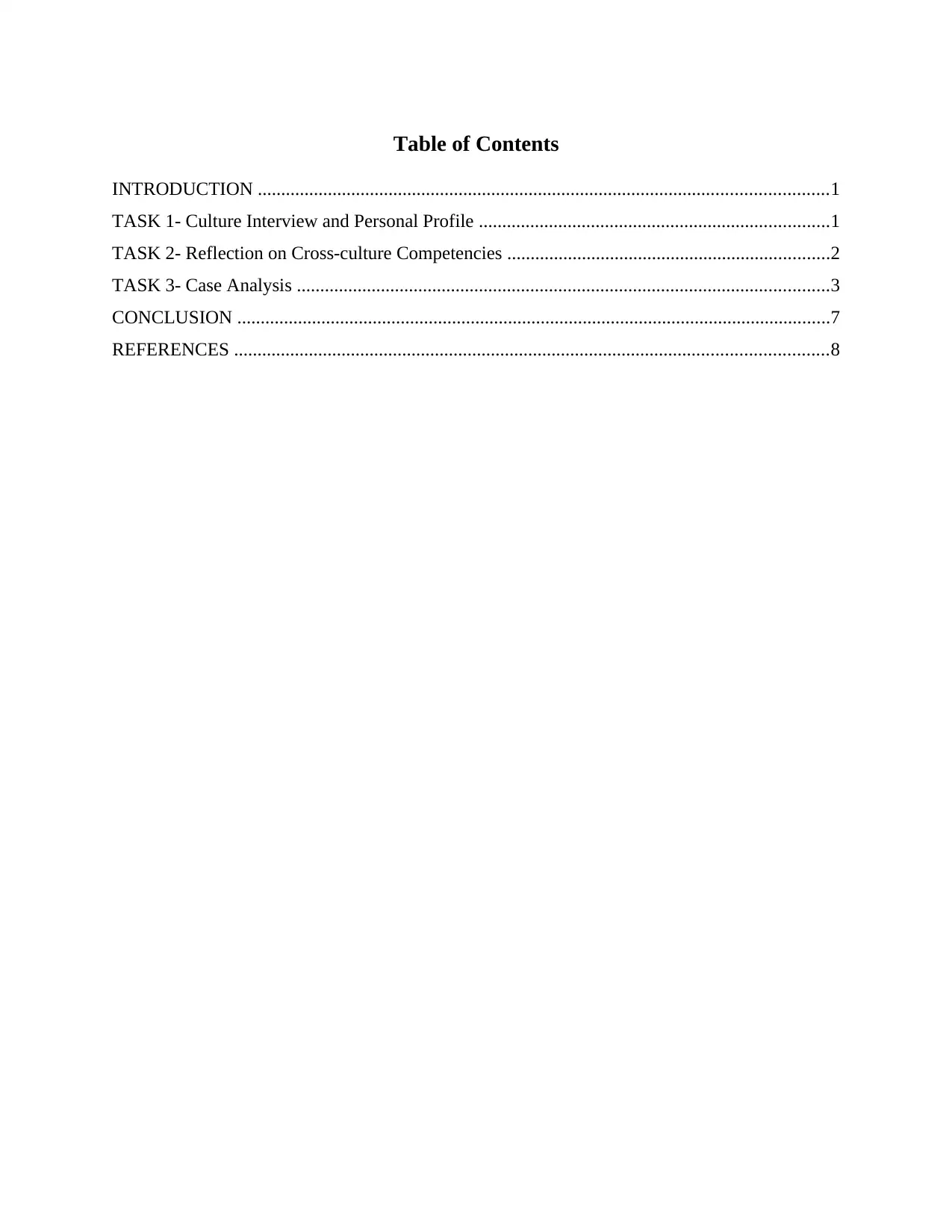
Table of Contents
INTRODUCTION ..........................................................................................................................1
TASK 1- Culture Interview and Personal Profile ...........................................................................1
TASK 2- Reflection on Cross-culture Competencies .....................................................................2
TASK 3- Case Analysis ..................................................................................................................3
CONCLUSION ...............................................................................................................................7
REFERENCES ...............................................................................................................................8
INTRODUCTION ..........................................................................................................................1
TASK 1- Culture Interview and Personal Profile ...........................................................................1
TASK 2- Reflection on Cross-culture Competencies .....................................................................2
TASK 3- Case Analysis ..................................................................................................................3
CONCLUSION ...............................................................................................................................7
REFERENCES ...............................................................................................................................8
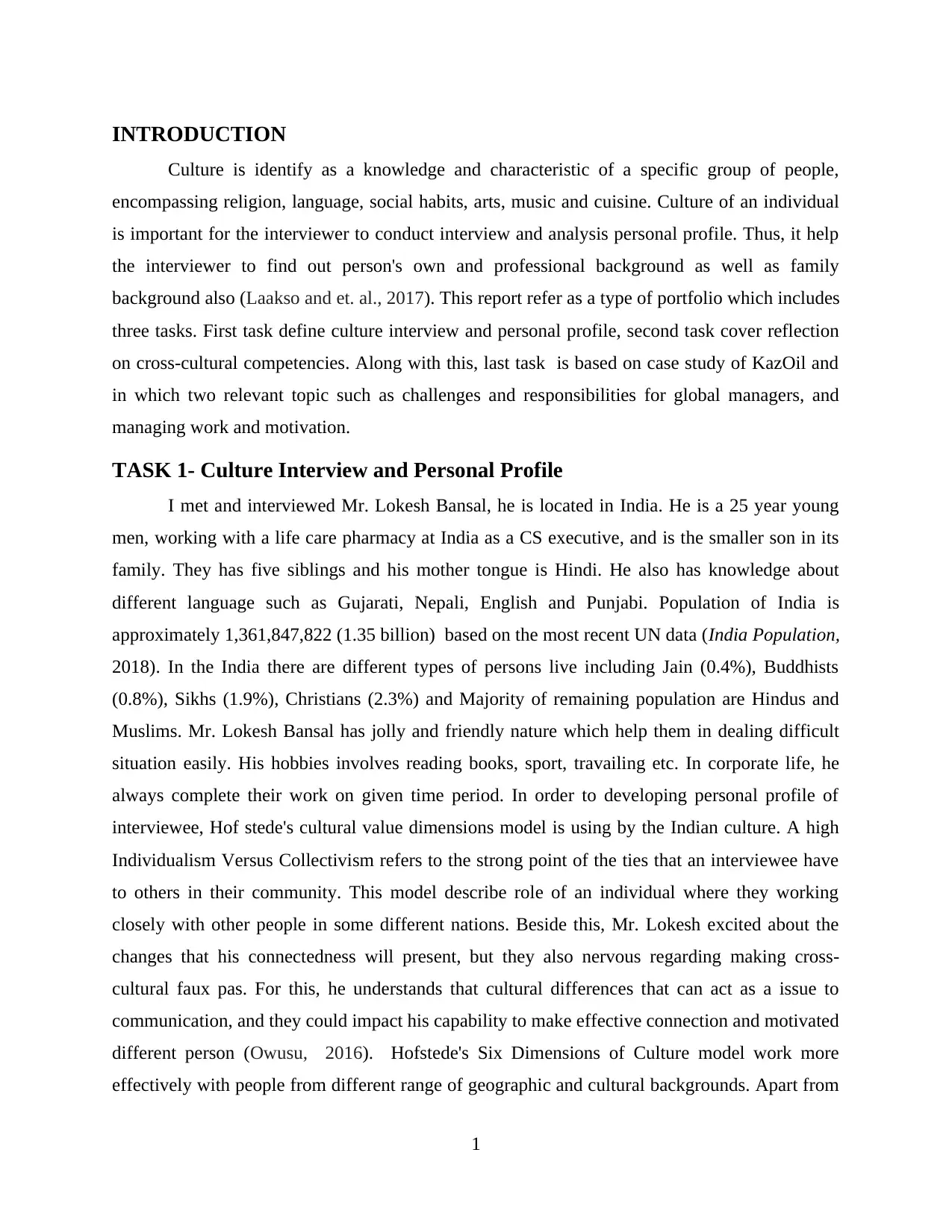
INTRODUCTION
Culture is identify as a knowledge and characteristic of a specific group of people,
encompassing religion, language, social habits, arts, music and cuisine. Culture of an individual
is important for the interviewer to conduct interview and analysis personal profile. Thus, it help
the interviewer to find out person's own and professional background as well as family
background also (Laakso and et. al., 2017). This report refer as a type of portfolio which includes
three tasks. First task define culture interview and personal profile, second task cover reflection
on cross-cultural competencies. Along with this, last task is based on case study of KazOil and
in which two relevant topic such as challenges and responsibilities for global managers, and
managing work and motivation.
TASK 1- Culture Interview and Personal Profile
I met and interviewed Mr. Lokesh Bansal, he is located in India. He is a 25 year young
men, working with a life care pharmacy at India as a CS executive, and is the smaller son in its
family. They has five siblings and his mother tongue is Hindi. He also has knowledge about
different language such as Gujarati, Nepali, English and Punjabi. Population of India is
approximately 1,361,847,822 (1.35 billion) based on the most recent UN data (India Population,
2018). In the India there are different types of persons live including Jain (0.4%), Buddhists
(0.8%), Sikhs (1.9%), Christians (2.3%) and Majority of remaining population are Hindus and
Muslims. Mr. Lokesh Bansal has jolly and friendly nature which help them in dealing difficult
situation easily. His hobbies involves reading books, sport, travailing etc. In corporate life, he
always complete their work on given time period. In order to developing personal profile of
interviewee, Hof stede's cultural value dimensions model is using by the Indian culture. A high
Individualism Versus Collectivism refers to the strong point of the ties that an interviewee have
to others in their community. This model describe role of an individual where they working
closely with other people in some different nations. Beside this, Mr. Lokesh excited about the
changes that his connectedness will present, but they also nervous regarding making cross-
cultural faux pas. For this, he understands that cultural differences that can act as a issue to
communication, and they could impact his capability to make effective connection and motivated
different person (Owusu, 2016). Hofstede's Six Dimensions of Culture model work more
effectively with people from different range of geographic and cultural backgrounds. Apart from
1
Culture is identify as a knowledge and characteristic of a specific group of people,
encompassing religion, language, social habits, arts, music and cuisine. Culture of an individual
is important for the interviewer to conduct interview and analysis personal profile. Thus, it help
the interviewer to find out person's own and professional background as well as family
background also (Laakso and et. al., 2017). This report refer as a type of portfolio which includes
three tasks. First task define culture interview and personal profile, second task cover reflection
on cross-cultural competencies. Along with this, last task is based on case study of KazOil and
in which two relevant topic such as challenges and responsibilities for global managers, and
managing work and motivation.
TASK 1- Culture Interview and Personal Profile
I met and interviewed Mr. Lokesh Bansal, he is located in India. He is a 25 year young
men, working with a life care pharmacy at India as a CS executive, and is the smaller son in its
family. They has five siblings and his mother tongue is Hindi. He also has knowledge about
different language such as Gujarati, Nepali, English and Punjabi. Population of India is
approximately 1,361,847,822 (1.35 billion) based on the most recent UN data (India Population,
2018). In the India there are different types of persons live including Jain (0.4%), Buddhists
(0.8%), Sikhs (1.9%), Christians (2.3%) and Majority of remaining population are Hindus and
Muslims. Mr. Lokesh Bansal has jolly and friendly nature which help them in dealing difficult
situation easily. His hobbies involves reading books, sport, travailing etc. In corporate life, he
always complete their work on given time period. In order to developing personal profile of
interviewee, Hof stede's cultural value dimensions model is using by the Indian culture. A high
Individualism Versus Collectivism refers to the strong point of the ties that an interviewee have
to others in their community. This model describe role of an individual where they working
closely with other people in some different nations. Beside this, Mr. Lokesh excited about the
changes that his connectedness will present, but they also nervous regarding making cross-
cultural faux pas. For this, he understands that cultural differences that can act as a issue to
communication, and they could impact his capability to make effective connection and motivated
different person (Owusu, 2016). Hofstede's Six Dimensions of Culture model work more
effectively with people from different range of geographic and cultural backgrounds. Apart from
1
⊘ This is a preview!⊘
Do you want full access?
Subscribe today to unlock all pages.

Trusted by 1+ million students worldwide
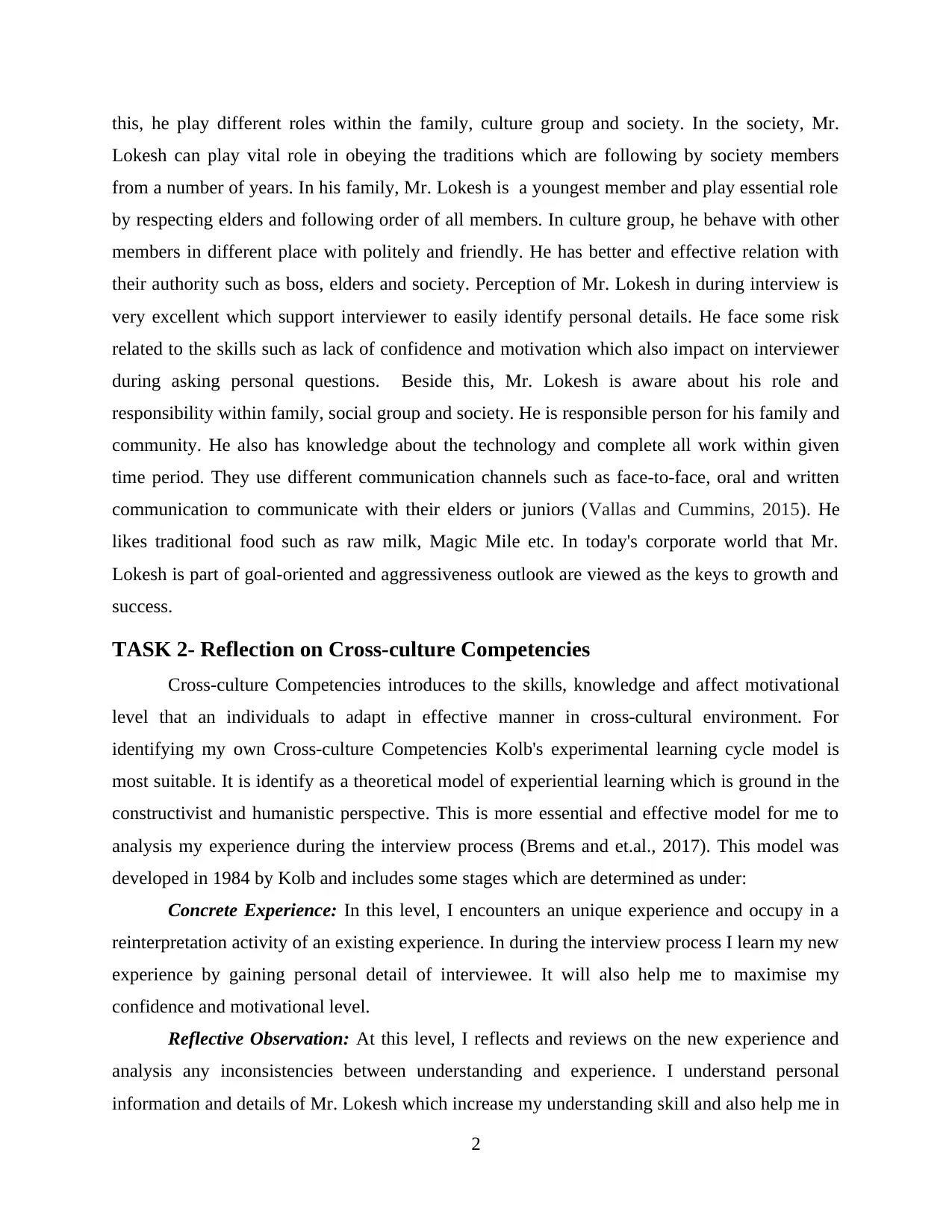
this, he play different roles within the family, culture group and society. In the society, Mr.
Lokesh can play vital role in obeying the traditions which are following by society members
from a number of years. In his family, Mr. Lokesh is a youngest member and play essential role
by respecting elders and following order of all members. In culture group, he behave with other
members in different place with politely and friendly. He has better and effective relation with
their authority such as boss, elders and society. Perception of Mr. Lokesh in during interview is
very excellent which support interviewer to easily identify personal details. He face some risk
related to the skills such as lack of confidence and motivation which also impact on interviewer
during asking personal questions. Beside this, Mr. Lokesh is aware about his role and
responsibility within family, social group and society. He is responsible person for his family and
community. He also has knowledge about the technology and complete all work within given
time period. They use different communication channels such as face-to-face, oral and written
communication to communicate with their elders or juniors (Vallas and Cummins, 2015). He
likes traditional food such as raw milk, Magic Mile etc. In today's corporate world that Mr.
Lokesh is part of goal-oriented and aggressiveness outlook are viewed as the keys to growth and
success.
TASK 2- Reflection on Cross-culture Competencies
Cross-culture Competencies introduces to the skills, knowledge and affect motivational
level that an individuals to adapt in effective manner in cross-cultural environment. For
identifying my own Cross-culture Competencies Kolb's experimental learning cycle model is
most suitable. It is identify as a theoretical model of experiential learning which is ground in the
constructivist and humanistic perspective. This is more essential and effective model for me to
analysis my experience during the interview process (Brems and et.al., 2017). This model was
developed in 1984 by Kolb and includes some stages which are determined as under:
Concrete Experience: In this level, I encounters an unique experience and occupy in a
reinterpretation activity of an existing experience. In during the interview process I learn my new
experience by gaining personal detail of interviewee. It will also help me to maximise my
confidence and motivational level.
Reflective Observation: At this level, I reflects and reviews on the new experience and
analysis any inconsistencies between understanding and experience. I understand personal
information and details of Mr. Lokesh which increase my understanding skill and also help me in
2
Lokesh can play vital role in obeying the traditions which are following by society members
from a number of years. In his family, Mr. Lokesh is a youngest member and play essential role
by respecting elders and following order of all members. In culture group, he behave with other
members in different place with politely and friendly. He has better and effective relation with
their authority such as boss, elders and society. Perception of Mr. Lokesh in during interview is
very excellent which support interviewer to easily identify personal details. He face some risk
related to the skills such as lack of confidence and motivation which also impact on interviewer
during asking personal questions. Beside this, Mr. Lokesh is aware about his role and
responsibility within family, social group and society. He is responsible person for his family and
community. He also has knowledge about the technology and complete all work within given
time period. They use different communication channels such as face-to-face, oral and written
communication to communicate with their elders or juniors (Vallas and Cummins, 2015). He
likes traditional food such as raw milk, Magic Mile etc. In today's corporate world that Mr.
Lokesh is part of goal-oriented and aggressiveness outlook are viewed as the keys to growth and
success.
TASK 2- Reflection on Cross-culture Competencies
Cross-culture Competencies introduces to the skills, knowledge and affect motivational
level that an individuals to adapt in effective manner in cross-cultural environment. For
identifying my own Cross-culture Competencies Kolb's experimental learning cycle model is
most suitable. It is identify as a theoretical model of experiential learning which is ground in the
constructivist and humanistic perspective. This is more essential and effective model for me to
analysis my experience during the interview process (Brems and et.al., 2017). This model was
developed in 1984 by Kolb and includes some stages which are determined as under:
Concrete Experience: In this level, I encounters an unique experience and occupy in a
reinterpretation activity of an existing experience. In during the interview process I learn my new
experience by gaining personal detail of interviewee. It will also help me to maximise my
confidence and motivational level.
Reflective Observation: At this level, I reflects and reviews on the new experience and
analysis any inconsistencies between understanding and experience. I understand personal
information and details of Mr. Lokesh which increase my understanding skill and also help me in
2
Paraphrase This Document
Need a fresh take? Get an instant paraphrase of this document with our AI Paraphraser
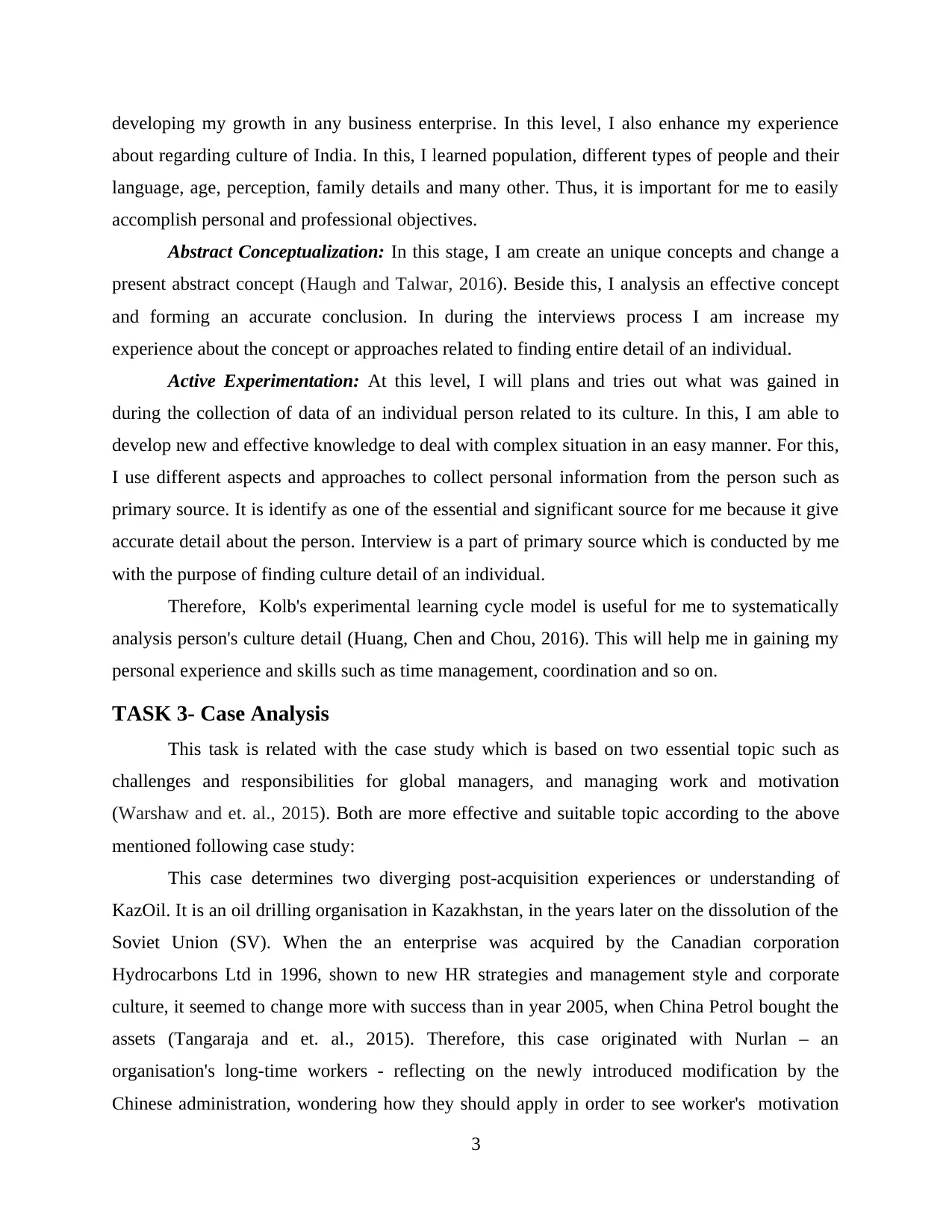
developing my growth in any business enterprise. In this level, I also enhance my experience
about regarding culture of India. In this, I learned population, different types of people and their
language, age, perception, family details and many other. Thus, it is important for me to easily
accomplish personal and professional objectives.
Abstract Conceptualization: In this stage, I am create an unique concepts and change a
present abstract concept (Haugh and Talwar, 2016). Beside this, I analysis an effective concept
and forming an accurate conclusion. In during the interviews process I am increase my
experience about the concept or approaches related to finding entire detail of an individual.
Active Experimentation: At this level, I will plans and tries out what was gained in
during the collection of data of an individual person related to its culture. In this, I am able to
develop new and effective knowledge to deal with complex situation in an easy manner. For this,
I use different aspects and approaches to collect personal information from the person such as
primary source. It is identify as one of the essential and significant source for me because it give
accurate detail about the person. Interview is a part of primary source which is conducted by me
with the purpose of finding culture detail of an individual.
Therefore, Kolb's experimental learning cycle model is useful for me to systematically
analysis person's culture detail (Huang, Chen and Chou, 2016). This will help me in gaining my
personal experience and skills such as time management, coordination and so on.
TASK 3- Case Analysis
This task is related with the case study which is based on two essential topic such as
challenges and responsibilities for global managers, and managing work and motivation
(Warshaw and et. al., 2015). Both are more effective and suitable topic according to the above
mentioned following case study:
This case determines two diverging post-acquisition experiences or understanding of
KazOil. It is an oil drilling organisation in Kazakhstan, in the years later on the dissolution of the
Soviet Union (SV). When the an enterprise was acquired by the Canadian corporation
Hydrocarbons Ltd in 1996, shown to new HR strategies and management style and corporate
culture, it seemed to change more with success than in year 2005, when China Petrol bought the
assets (Tangaraja and et. al., 2015). Therefore, this case originated with Nurlan – an
organisation's long-time workers - reflecting on the newly introduced modification by the
Chinese administration, wondering how they should apply in order to see worker's motivation
3
about regarding culture of India. In this, I learned population, different types of people and their
language, age, perception, family details and many other. Thus, it is important for me to easily
accomplish personal and professional objectives.
Abstract Conceptualization: In this stage, I am create an unique concepts and change a
present abstract concept (Haugh and Talwar, 2016). Beside this, I analysis an effective concept
and forming an accurate conclusion. In during the interviews process I am increase my
experience about the concept or approaches related to finding entire detail of an individual.
Active Experimentation: At this level, I will plans and tries out what was gained in
during the collection of data of an individual person related to its culture. In this, I am able to
develop new and effective knowledge to deal with complex situation in an easy manner. For this,
I use different aspects and approaches to collect personal information from the person such as
primary source. It is identify as one of the essential and significant source for me because it give
accurate detail about the person. Interview is a part of primary source which is conducted by me
with the purpose of finding culture detail of an individual.
Therefore, Kolb's experimental learning cycle model is useful for me to systematically
analysis person's culture detail (Huang, Chen and Chou, 2016). This will help me in gaining my
personal experience and skills such as time management, coordination and so on.
TASK 3- Case Analysis
This task is related with the case study which is based on two essential topic such as
challenges and responsibilities for global managers, and managing work and motivation
(Warshaw and et. al., 2015). Both are more effective and suitable topic according to the above
mentioned following case study:
This case determines two diverging post-acquisition experiences or understanding of
KazOil. It is an oil drilling organisation in Kazakhstan, in the years later on the dissolution of the
Soviet Union (SV). When the an enterprise was acquired by the Canadian corporation
Hydrocarbons Ltd in 1996, shown to new HR strategies and management style and corporate
culture, it seemed to change more with success than in year 2005, when China Petrol bought the
assets (Tangaraja and et. al., 2015). Therefore, this case originated with Nurlan – an
organisation's long-time workers - reflecting on the newly introduced modification by the
Chinese administration, wondering how they should apply in order to see worker's motivation
3
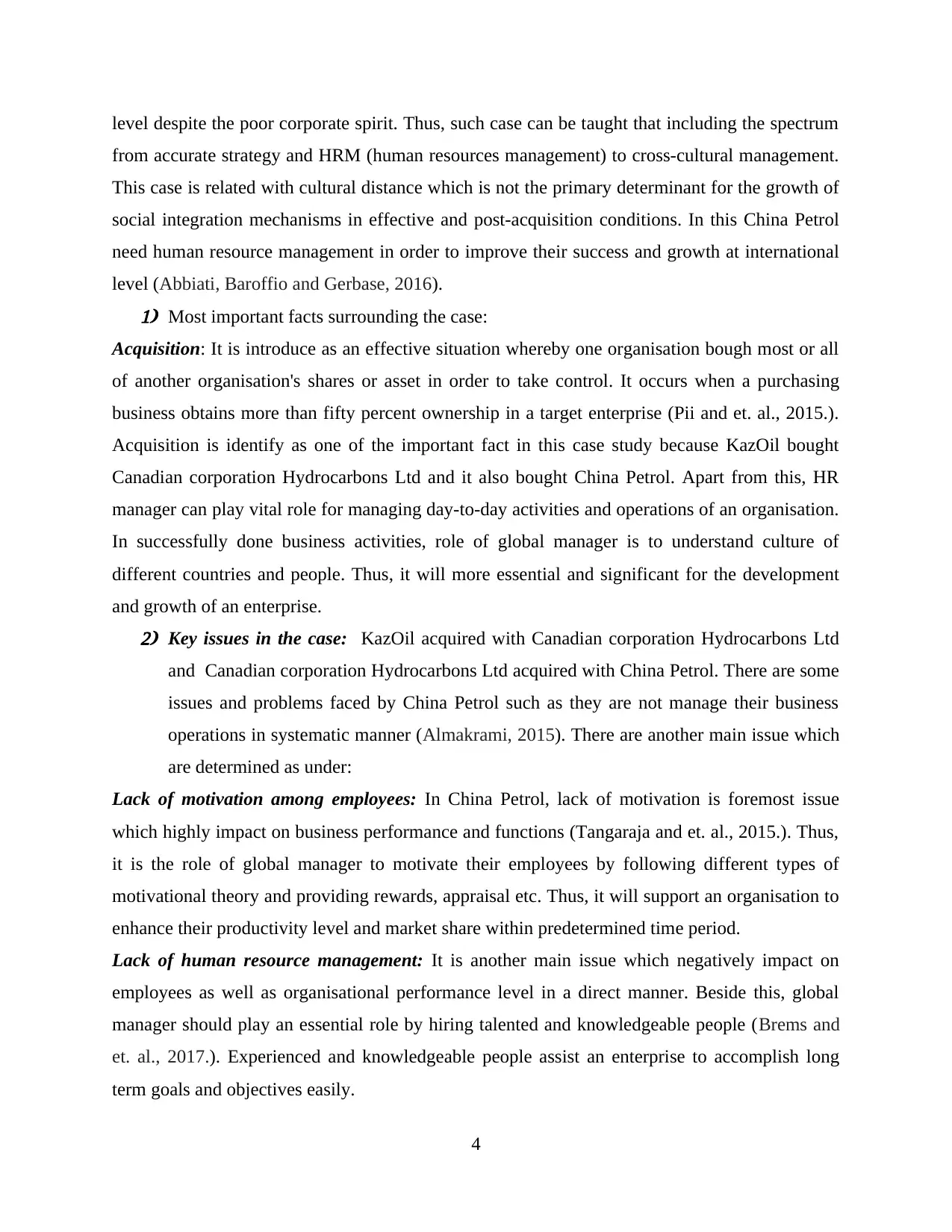
level despite the poor corporate spirit. Thus, such case can be taught that including the spectrum
from accurate strategy and HRM (human resources management) to cross-cultural management.
This case is related with cultural distance which is not the primary determinant for the growth of
social integration mechanisms in effective and post-acquisition conditions. In this China Petrol
need human resource management in order to improve their success and growth at international
level (Abbiati, Baroffio and Gerbase, 2016).1) Most important facts surrounding the case:
Acquisition: It is introduce as an effective situation whereby one organisation bough most or all
of another organisation's shares or asset in order to take control. It occurs when a purchasing
business obtains more than fifty percent ownership in a target enterprise (Pii and et. al., 2015.).
Acquisition is identify as one of the important fact in this case study because KazOil bought
Canadian corporation Hydrocarbons Ltd and it also bought China Petrol. Apart from this, HR
manager can play vital role for managing day-to-day activities and operations of an organisation.
In successfully done business activities, role of global manager is to understand culture of
different countries and people. Thus, it will more essential and significant for the development
and growth of an enterprise.2) Key issues in the case: KazOil acquired with Canadian corporation Hydrocarbons Ltd
and Canadian corporation Hydrocarbons Ltd acquired with China Petrol. There are some
issues and problems faced by China Petrol such as they are not manage their business
operations in systematic manner (Almakrami, 2015). There are another main issue which
are determined as under:
Lack of motivation among employees: In China Petrol, lack of motivation is foremost issue
which highly impact on business performance and functions (Tangaraja and et. al., 2015.). Thus,
it is the role of global manager to motivate their employees by following different types of
motivational theory and providing rewards, appraisal etc. Thus, it will support an organisation to
enhance their productivity level and market share within predetermined time period.
Lack of human resource management: It is another main issue which negatively impact on
employees as well as organisational performance level in a direct manner. Beside this, global
manager should play an essential role by hiring talented and knowledgeable people (Brems and
et. al., 2017.). Experienced and knowledgeable people assist an enterprise to accomplish long
term goals and objectives easily.
4
from accurate strategy and HRM (human resources management) to cross-cultural management.
This case is related with cultural distance which is not the primary determinant for the growth of
social integration mechanisms in effective and post-acquisition conditions. In this China Petrol
need human resource management in order to improve their success and growth at international
level (Abbiati, Baroffio and Gerbase, 2016).1) Most important facts surrounding the case:
Acquisition: It is introduce as an effective situation whereby one organisation bough most or all
of another organisation's shares or asset in order to take control. It occurs when a purchasing
business obtains more than fifty percent ownership in a target enterprise (Pii and et. al., 2015.).
Acquisition is identify as one of the important fact in this case study because KazOil bought
Canadian corporation Hydrocarbons Ltd and it also bought China Petrol. Apart from this, HR
manager can play vital role for managing day-to-day activities and operations of an organisation.
In successfully done business activities, role of global manager is to understand culture of
different countries and people. Thus, it will more essential and significant for the development
and growth of an enterprise.2) Key issues in the case: KazOil acquired with Canadian corporation Hydrocarbons Ltd
and Canadian corporation Hydrocarbons Ltd acquired with China Petrol. There are some
issues and problems faced by China Petrol such as they are not manage their business
operations in systematic manner (Almakrami, 2015). There are another main issue which
are determined as under:
Lack of motivation among employees: In China Petrol, lack of motivation is foremost issue
which highly impact on business performance and functions (Tangaraja and et. al., 2015.). Thus,
it is the role of global manager to motivate their employees by following different types of
motivational theory and providing rewards, appraisal etc. Thus, it will support an organisation to
enhance their productivity level and market share within predetermined time period.
Lack of human resource management: It is another main issue which negatively impact on
employees as well as organisational performance level in a direct manner. Beside this, global
manager should play an essential role by hiring talented and knowledgeable people (Brems and
et. al., 2017.). Experienced and knowledgeable people assist an enterprise to accomplish long
term goals and objectives easily.
4
⊘ This is a preview!⊘
Do you want full access?
Subscribe today to unlock all pages.

Trusted by 1+ million students worldwide
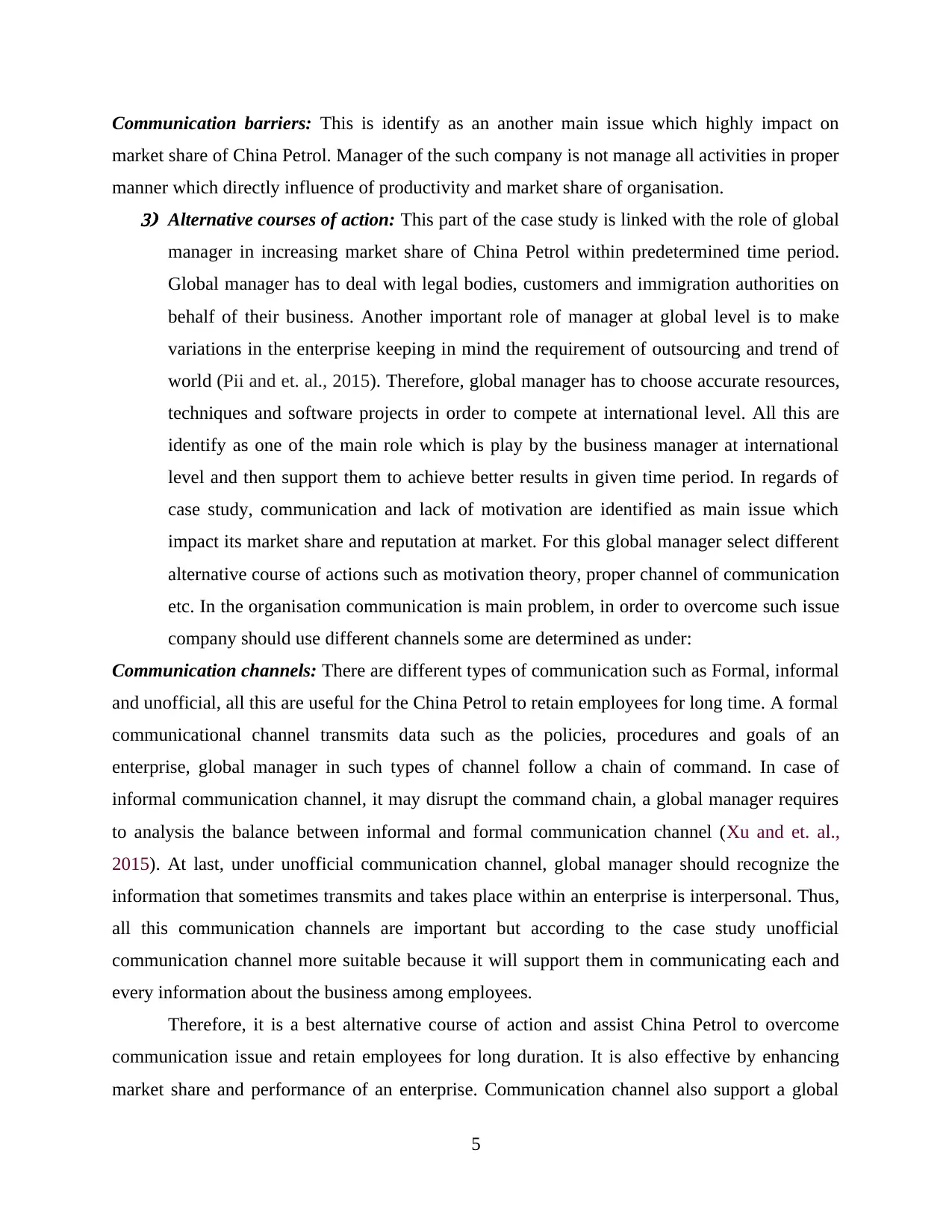
Communication barriers: This is identify as an another main issue which highly impact on
market share of China Petrol. Manager of the such company is not manage all activities in proper
manner which directly influence of productivity and market share of organisation.3) Alternative courses of action: This part of the case study is linked with the role of global
manager in increasing market share of China Petrol within predetermined time period.
Global manager has to deal with legal bodies, customers and immigration authorities on
behalf of their business. Another important role of manager at global level is to make
variations in the enterprise keeping in mind the requirement of outsourcing and trend of
world (Pii and et. al., 2015). Therefore, global manager has to choose accurate resources,
techniques and software projects in order to compete at international level. All this are
identify as one of the main role which is play by the business manager at international
level and then support them to achieve better results in given time period. In regards of
case study, communication and lack of motivation are identified as main issue which
impact its market share and reputation at market. For this global manager select different
alternative course of actions such as motivation theory, proper channel of communication
etc. In the organisation communication is main problem, in order to overcome such issue
company should use different channels some are determined as under:
Communication channels: There are different types of communication such as Formal, informal
and unofficial, all this are useful for the China Petrol to retain employees for long time. A formal
communicational channel transmits data such as the policies, procedures and goals of an
enterprise, global manager in such types of channel follow a chain of command. In case of
informal communication channel, it may disrupt the command chain, a global manager requires
to analysis the balance between informal and formal communication channel (Xu and et. al.,
2015). At last, under unofficial communication channel, global manager should recognize the
information that sometimes transmits and takes place within an enterprise is interpersonal. Thus,
all this communication channels are important but according to the case study unofficial
communication channel more suitable because it will support them in communicating each and
every information about the business among employees.
Therefore, it is a best alternative course of action and assist China Petrol to overcome
communication issue and retain employees for long duration. It is also effective by enhancing
market share and performance of an enterprise. Communication channel also support a global
5
market share of China Petrol. Manager of the such company is not manage all activities in proper
manner which directly influence of productivity and market share of organisation.3) Alternative courses of action: This part of the case study is linked with the role of global
manager in increasing market share of China Petrol within predetermined time period.
Global manager has to deal with legal bodies, customers and immigration authorities on
behalf of their business. Another important role of manager at global level is to make
variations in the enterprise keeping in mind the requirement of outsourcing and trend of
world (Pii and et. al., 2015). Therefore, global manager has to choose accurate resources,
techniques and software projects in order to compete at international level. All this are
identify as one of the main role which is play by the business manager at international
level and then support them to achieve better results in given time period. In regards of
case study, communication and lack of motivation are identified as main issue which
impact its market share and reputation at market. For this global manager select different
alternative course of actions such as motivation theory, proper channel of communication
etc. In the organisation communication is main problem, in order to overcome such issue
company should use different channels some are determined as under:
Communication channels: There are different types of communication such as Formal, informal
and unofficial, all this are useful for the China Petrol to retain employees for long time. A formal
communicational channel transmits data such as the policies, procedures and goals of an
enterprise, global manager in such types of channel follow a chain of command. In case of
informal communication channel, it may disrupt the command chain, a global manager requires
to analysis the balance between informal and formal communication channel (Xu and et. al.,
2015). At last, under unofficial communication channel, global manager should recognize the
information that sometimes transmits and takes place within an enterprise is interpersonal. Thus,
all this communication channels are important but according to the case study unofficial
communication channel more suitable because it will support them in communicating each and
every information about the business among employees.
Therefore, it is a best alternative course of action and assist China Petrol to overcome
communication issue and retain employees for long duration. It is also effective by enhancing
market share and performance of an enterprise. Communication channel also support a global
5
Paraphrase This Document
Need a fresh take? Get an instant paraphrase of this document with our AI Paraphraser
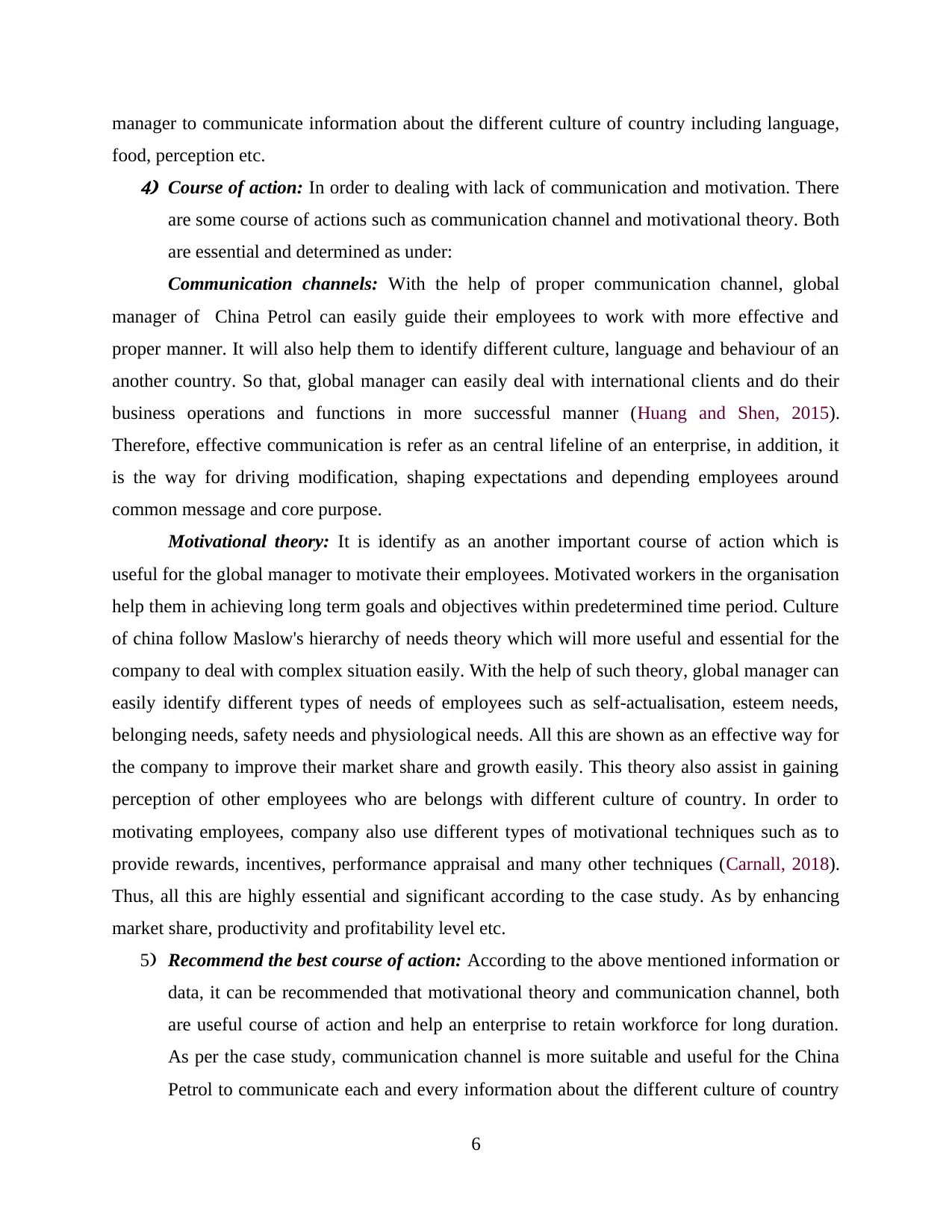
manager to communicate information about the different culture of country including language,
food, perception etc.4) Course of action: In order to dealing with lack of communication and motivation. There
are some course of actions such as communication channel and motivational theory. Both
are essential and determined as under:
Communication channels: With the help of proper communication channel, global
manager of China Petrol can easily guide their employees to work with more effective and
proper manner. It will also help them to identify different culture, language and behaviour of an
another country. So that, global manager can easily deal with international clients and do their
business operations and functions in more successful manner (Huang and Shen, 2015).
Therefore, effective communication is refer as an central lifeline of an enterprise, in addition, it
is the way for driving modification, shaping expectations and depending employees around
common message and core purpose.
Motivational theory: It is identify as an another important course of action which is
useful for the global manager to motivate their employees. Motivated workers in the organisation
help them in achieving long term goals and objectives within predetermined time period. Culture
of china follow Maslow's hierarchy of needs theory which will more useful and essential for the
company to deal with complex situation easily. With the help of such theory, global manager can
easily identify different types of needs of employees such as self-actualisation, esteem needs,
belonging needs, safety needs and physiological needs. All this are shown as an effective way for
the company to improve their market share and growth easily. This theory also assist in gaining
perception of other employees who are belongs with different culture of country. In order to
motivating employees, company also use different types of motivational techniques such as to
provide rewards, incentives, performance appraisal and many other techniques (Carnall, 2018).
Thus, all this are highly essential and significant according to the case study. As by enhancing
market share, productivity and profitability level etc.
5) Recommend the best course of action: According to the above mentioned information or
data, it can be recommended that motivational theory and communication channel, both
are useful course of action and help an enterprise to retain workforce for long duration.
As per the case study, communication channel is more suitable and useful for the China
Petrol to communicate each and every information about the different culture of country
6
food, perception etc.4) Course of action: In order to dealing with lack of communication and motivation. There
are some course of actions such as communication channel and motivational theory. Both
are essential and determined as under:
Communication channels: With the help of proper communication channel, global
manager of China Petrol can easily guide their employees to work with more effective and
proper manner. It will also help them to identify different culture, language and behaviour of an
another country. So that, global manager can easily deal with international clients and do their
business operations and functions in more successful manner (Huang and Shen, 2015).
Therefore, effective communication is refer as an central lifeline of an enterprise, in addition, it
is the way for driving modification, shaping expectations and depending employees around
common message and core purpose.
Motivational theory: It is identify as an another important course of action which is
useful for the global manager to motivate their employees. Motivated workers in the organisation
help them in achieving long term goals and objectives within predetermined time period. Culture
of china follow Maslow's hierarchy of needs theory which will more useful and essential for the
company to deal with complex situation easily. With the help of such theory, global manager can
easily identify different types of needs of employees such as self-actualisation, esteem needs,
belonging needs, safety needs and physiological needs. All this are shown as an effective way for
the company to improve their market share and growth easily. This theory also assist in gaining
perception of other employees who are belongs with different culture of country. In order to
motivating employees, company also use different types of motivational techniques such as to
provide rewards, incentives, performance appraisal and many other techniques (Carnall, 2018).
Thus, all this are highly essential and significant according to the case study. As by enhancing
market share, productivity and profitability level etc.
5) Recommend the best course of action: According to the above mentioned information or
data, it can be recommended that motivational theory and communication channel, both
are useful course of action and help an enterprise to retain workforce for long duration.
As per the case study, communication channel is more suitable and useful for the China
Petrol to communicate each and every information about the different culture of country
6
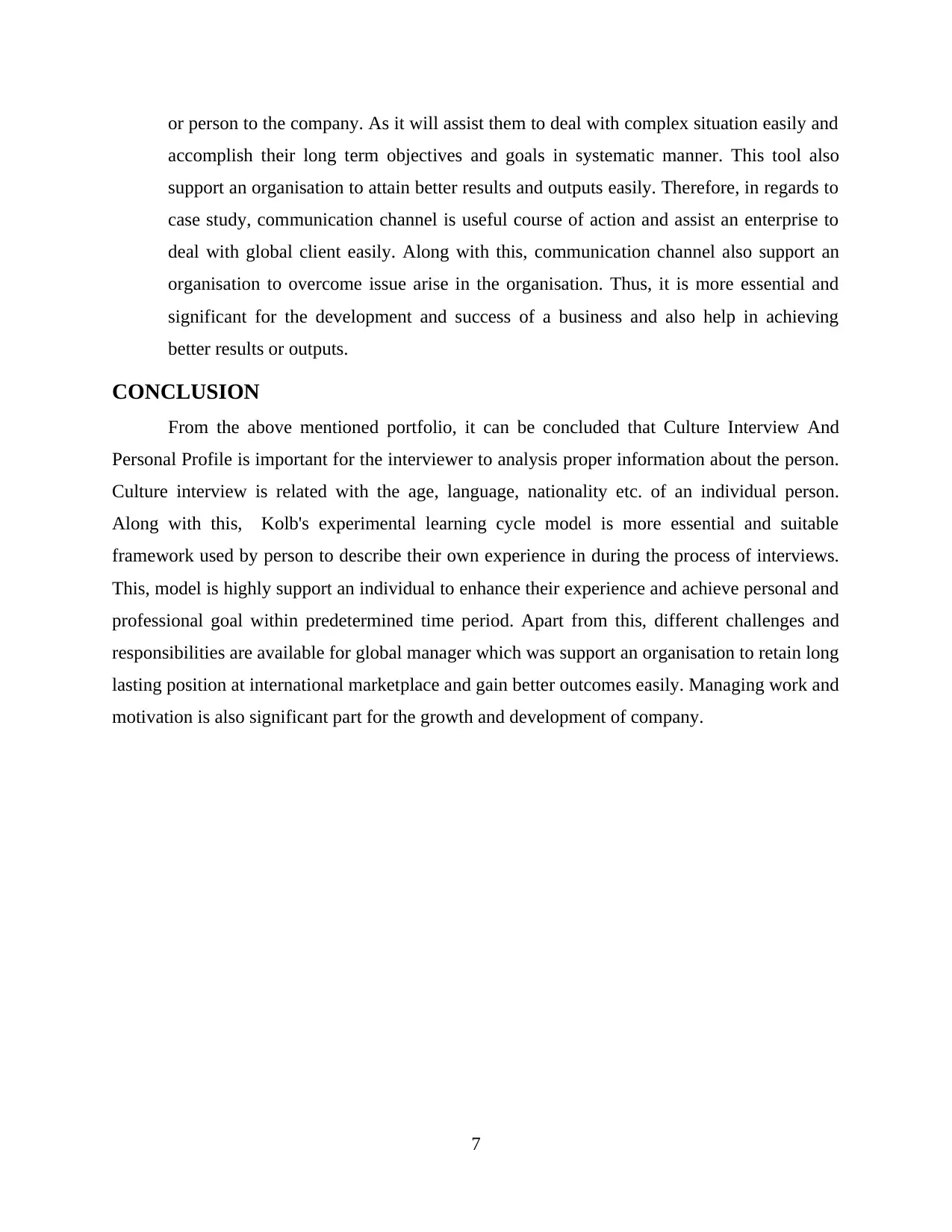
or person to the company. As it will assist them to deal with complex situation easily and
accomplish their long term objectives and goals in systematic manner. This tool also
support an organisation to attain better results and outputs easily. Therefore, in regards to
case study, communication channel is useful course of action and assist an enterprise to
deal with global client easily. Along with this, communication channel also support an
organisation to overcome issue arise in the organisation. Thus, it is more essential and
significant for the development and success of a business and also help in achieving
better results or outputs.
CONCLUSION
From the above mentioned portfolio, it can be concluded that Culture Interview And
Personal Profile is important for the interviewer to analysis proper information about the person.
Culture interview is related with the age, language, nationality etc. of an individual person.
Along with this, Kolb's experimental learning cycle model is more essential and suitable
framework used by person to describe their own experience in during the process of interviews.
This, model is highly support an individual to enhance their experience and achieve personal and
professional goal within predetermined time period. Apart from this, different challenges and
responsibilities are available for global manager which was support an organisation to retain long
lasting position at international marketplace and gain better outcomes easily. Managing work and
motivation is also significant part for the growth and development of company.
7
accomplish their long term objectives and goals in systematic manner. This tool also
support an organisation to attain better results and outputs easily. Therefore, in regards to
case study, communication channel is useful course of action and assist an enterprise to
deal with global client easily. Along with this, communication channel also support an
organisation to overcome issue arise in the organisation. Thus, it is more essential and
significant for the development and success of a business and also help in achieving
better results or outputs.
CONCLUSION
From the above mentioned portfolio, it can be concluded that Culture Interview And
Personal Profile is important for the interviewer to analysis proper information about the person.
Culture interview is related with the age, language, nationality etc. of an individual person.
Along with this, Kolb's experimental learning cycle model is more essential and suitable
framework used by person to describe their own experience in during the process of interviews.
This, model is highly support an individual to enhance their experience and achieve personal and
professional goal within predetermined time period. Apart from this, different challenges and
responsibilities are available for global manager which was support an organisation to retain long
lasting position at international marketplace and gain better outcomes easily. Managing work and
motivation is also significant part for the growth and development of company.
7
⊘ This is a preview!⊘
Do you want full access?
Subscribe today to unlock all pages.

Trusted by 1+ million students worldwide
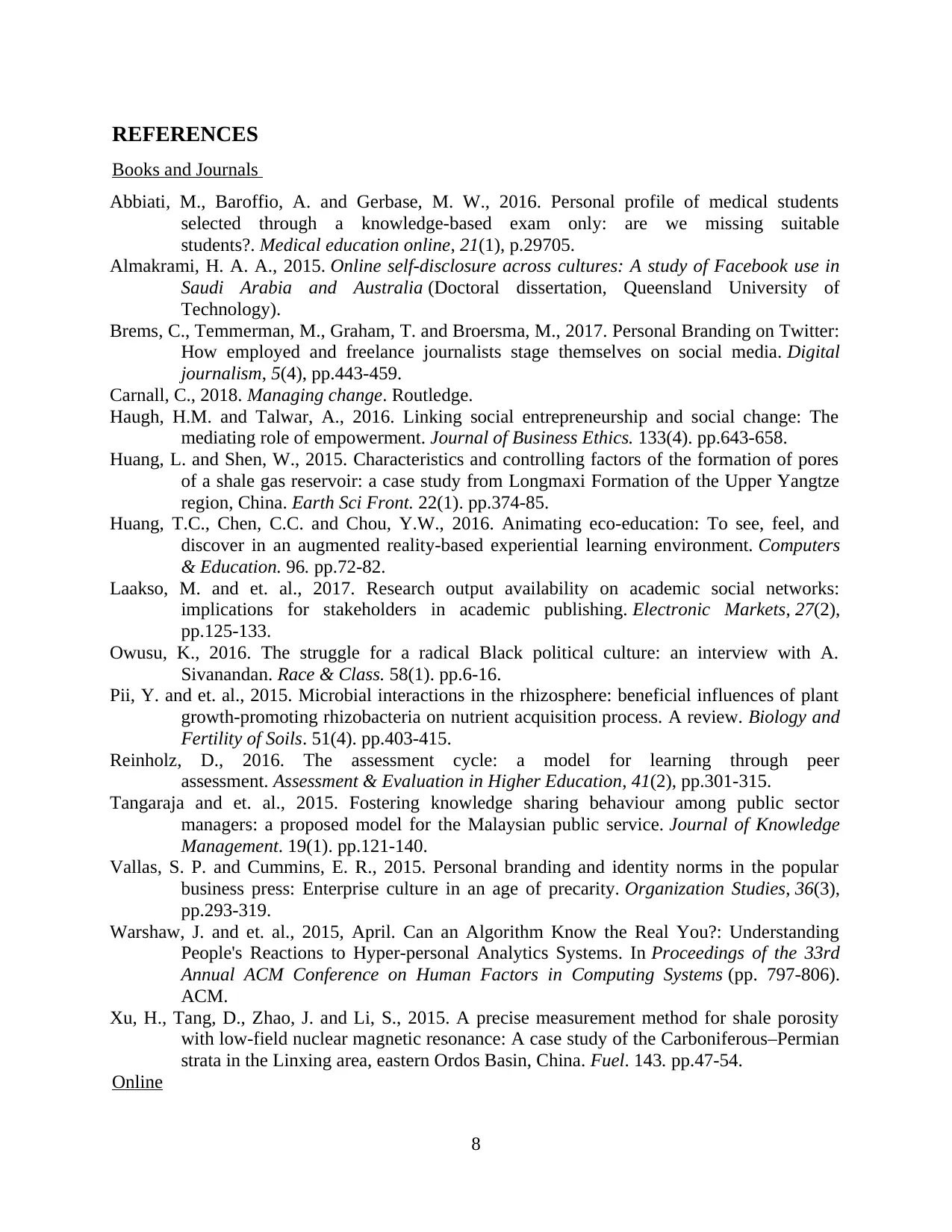
REFERENCES
Books and Journals
Abbiati, M., Baroffio, A. and Gerbase, M. W., 2016. Personal profile of medical students
selected through a knowledge-based exam only: are we missing suitable
students?. Medical education online, 21(1), p.29705.
Almakrami, H. A. A., 2015. Online self-disclosure across cultures: A study of Facebook use in
Saudi Arabia and Australia (Doctoral dissertation, Queensland University of
Technology).
Brems, C., Temmerman, M., Graham, T. and Broersma, M., 2017. Personal Branding on Twitter:
How employed and freelance journalists stage themselves on social media. Digital
journalism, 5(4), pp.443-459.
Carnall, C., 2018. Managing change. Routledge.
Haugh, H.M. and Talwar, A., 2016. Linking social entrepreneurship and social change: The
mediating role of empowerment. Journal of Business Ethics. 133(4). pp.643-658.
Huang, L. and Shen, W., 2015. Characteristics and controlling factors of the formation of pores
of a shale gas reservoir: a case study from Longmaxi Formation of the Upper Yangtze
region, China. Earth Sci Front. 22(1). pp.374-85.
Huang, T.C., Chen, C.C. and Chou, Y.W., 2016. Animating eco-education: To see, feel, and
discover in an augmented reality-based experiential learning environment. Computers
& Education. 96. pp.72-82.
Laakso, M. and et. al., 2017. Research output availability on academic social networks:
implications for stakeholders in academic publishing. Electronic Markets, 27(2),
pp.125-133.
Owusu, K., 2016. The struggle for a radical Black political culture: an interview with A.
Sivanandan. Race & Class. 58(1). pp.6-16.
Pii, Y. and et. al., 2015. Microbial interactions in the rhizosphere: beneficial influences of plant
growth-promoting rhizobacteria on nutrient acquisition process. A review. Biology and
Fertility of Soils. 51(4). pp.403-415.
Reinholz, D., 2016. The assessment cycle: a model for learning through peer
assessment. Assessment & Evaluation in Higher Education, 41(2), pp.301-315.
Tangaraja and et. al., 2015. Fostering knowledge sharing behaviour among public sector
managers: a proposed model for the Malaysian public service. Journal of Knowledge
Management. 19(1). pp.121-140.
Vallas, S. P. and Cummins, E. R., 2015. Personal branding and identity norms in the popular
business press: Enterprise culture in an age of precarity. Organization Studies, 36(3),
pp.293-319.
Warshaw, J. and et. al., 2015, April. Can an Algorithm Know the Real You?: Understanding
People's Reactions to Hyper-personal Analytics Systems. In Proceedings of the 33rd
Annual ACM Conference on Human Factors in Computing Systems (pp. 797-806).
ACM.
Xu, H., Tang, D., Zhao, J. and Li, S., 2015. A precise measurement method for shale porosity
with low-field nuclear magnetic resonance: A case study of the Carboniferous–Permian
strata in the Linxing area, eastern Ordos Basin, China. Fuel. 143. pp.47-54.
Online
8
Books and Journals
Abbiati, M., Baroffio, A. and Gerbase, M. W., 2016. Personal profile of medical students
selected through a knowledge-based exam only: are we missing suitable
students?. Medical education online, 21(1), p.29705.
Almakrami, H. A. A., 2015. Online self-disclosure across cultures: A study of Facebook use in
Saudi Arabia and Australia (Doctoral dissertation, Queensland University of
Technology).
Brems, C., Temmerman, M., Graham, T. and Broersma, M., 2017. Personal Branding on Twitter:
How employed and freelance journalists stage themselves on social media. Digital
journalism, 5(4), pp.443-459.
Carnall, C., 2018. Managing change. Routledge.
Haugh, H.M. and Talwar, A., 2016. Linking social entrepreneurship and social change: The
mediating role of empowerment. Journal of Business Ethics. 133(4). pp.643-658.
Huang, L. and Shen, W., 2015. Characteristics and controlling factors of the formation of pores
of a shale gas reservoir: a case study from Longmaxi Formation of the Upper Yangtze
region, China. Earth Sci Front. 22(1). pp.374-85.
Huang, T.C., Chen, C.C. and Chou, Y.W., 2016. Animating eco-education: To see, feel, and
discover in an augmented reality-based experiential learning environment. Computers
& Education. 96. pp.72-82.
Laakso, M. and et. al., 2017. Research output availability on academic social networks:
implications for stakeholders in academic publishing. Electronic Markets, 27(2),
pp.125-133.
Owusu, K., 2016. The struggle for a radical Black political culture: an interview with A.
Sivanandan. Race & Class. 58(1). pp.6-16.
Pii, Y. and et. al., 2015. Microbial interactions in the rhizosphere: beneficial influences of plant
growth-promoting rhizobacteria on nutrient acquisition process. A review. Biology and
Fertility of Soils. 51(4). pp.403-415.
Reinholz, D., 2016. The assessment cycle: a model for learning through peer
assessment. Assessment & Evaluation in Higher Education, 41(2), pp.301-315.
Tangaraja and et. al., 2015. Fostering knowledge sharing behaviour among public sector
managers: a proposed model for the Malaysian public service. Journal of Knowledge
Management. 19(1). pp.121-140.
Vallas, S. P. and Cummins, E. R., 2015. Personal branding and identity norms in the popular
business press: Enterprise culture in an age of precarity. Organization Studies, 36(3),
pp.293-319.
Warshaw, J. and et. al., 2015, April. Can an Algorithm Know the Real You?: Understanding
People's Reactions to Hyper-personal Analytics Systems. In Proceedings of the 33rd
Annual ACM Conference on Human Factors in Computing Systems (pp. 797-806).
ACM.
Xu, H., Tang, D., Zhao, J. and Li, S., 2015. A precise measurement method for shale porosity
with low-field nuclear magnetic resonance: A case study of the Carboniferous–Permian
strata in the Linxing area, eastern Ordos Basin, China. Fuel. 143. pp.47-54.
Online
8
Paraphrase This Document
Need a fresh take? Get an instant paraphrase of this document with our AI Paraphraser
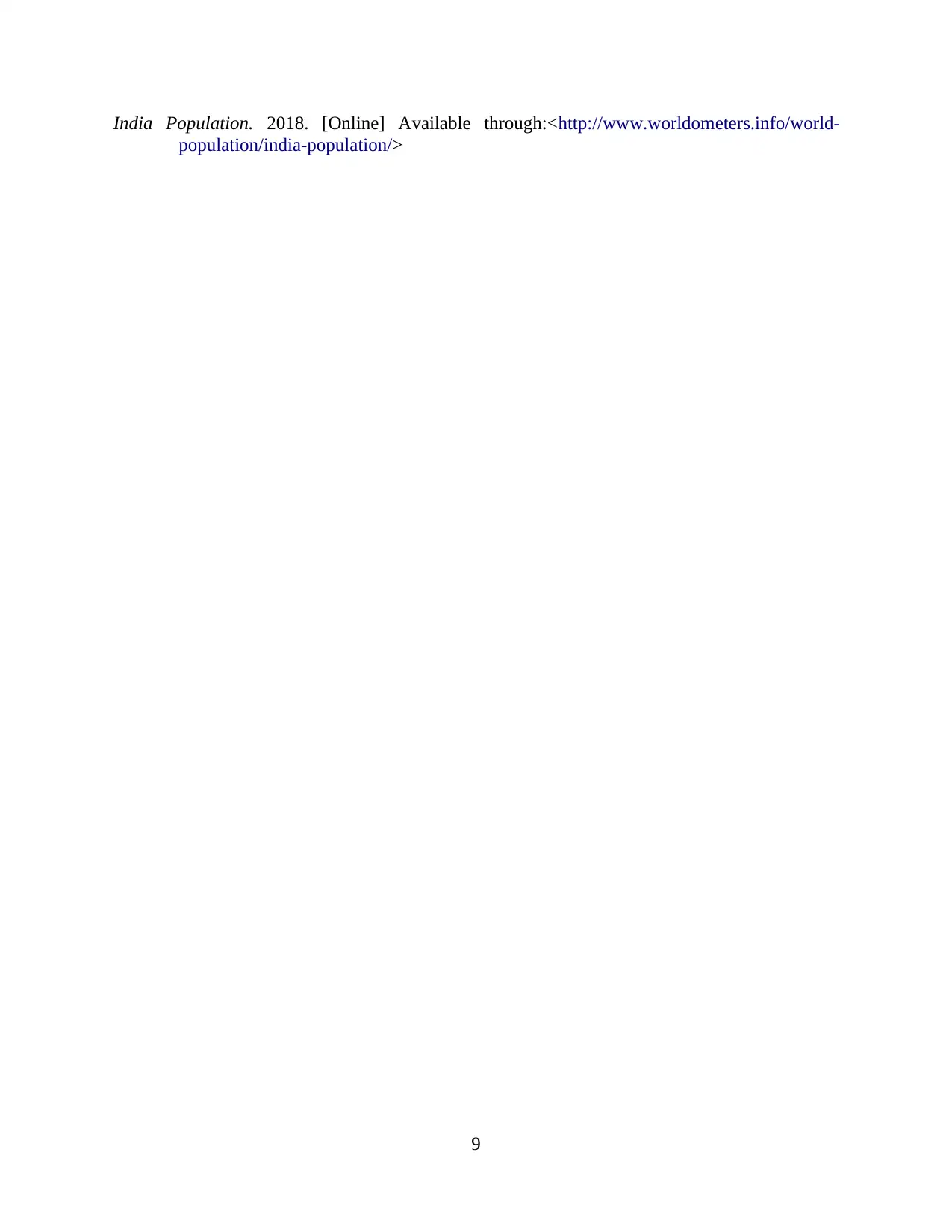
India Population. 2018. [Online] Available through:<http://www.worldometers.info/world-
population/india-population/>
9
population/india-population/>
9
1 out of 11
Related Documents
Your All-in-One AI-Powered Toolkit for Academic Success.
+13062052269
info@desklib.com
Available 24*7 on WhatsApp / Email
![[object Object]](/_next/static/media/star-bottom.7253800d.svg)
Unlock your academic potential
Copyright © 2020–2025 A2Z Services. All Rights Reserved. Developed and managed by ZUCOL.





